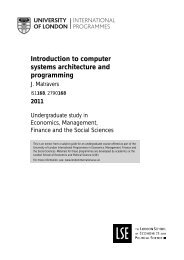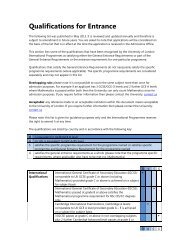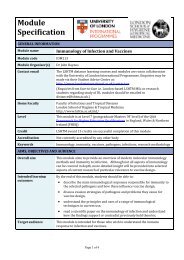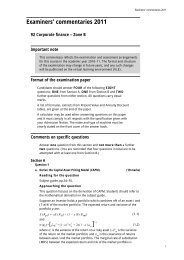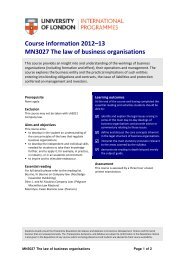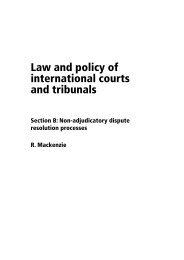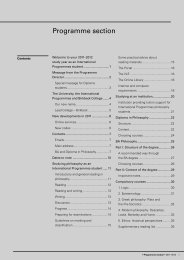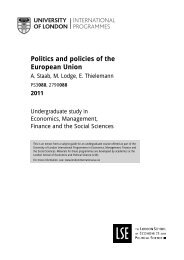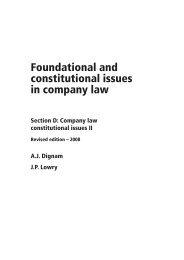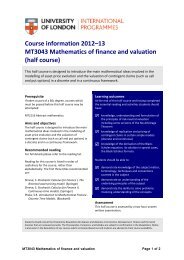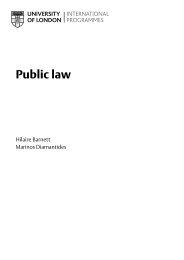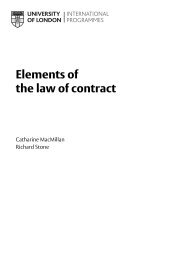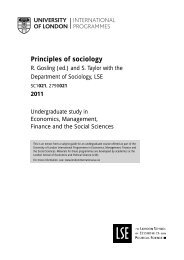2013–2014 Clinical Trials Epidemiology Global Health Policy ...
2013–2014 Clinical Trials Epidemiology Global Health Policy ...
2013–2014 Clinical Trials Epidemiology Global Health Policy ...
Create successful ePaper yourself
Turn your PDF publications into a flip-book with our unique Google optimized e-Paper software.
Public <strong>Health</strong><br />
A welcome from Ros Plowman (Course Director) and Cathy Zimmerman (Deputy Course Director)<br />
Ros Plowman Cathy<br />
Zimmerman<br />
The MSc Public <strong>Health</strong> courses<br />
provide an opportunity for<br />
students to gain knowledge<br />
and skills that will enable<br />
them to address diverse public<br />
health issues in low, middle<br />
and high income settings.<br />
The courses draw on<br />
the School’s long history<br />
of international work and<br />
expertise in a variety of<br />
Students on the School’s Public <strong>Health</strong> courses use<br />
academic study to deepen their understanding of<br />
public health issues and to increase their potential<br />
career development in health-related elds. Students<br />
on these courses come from diverse backgrounds.<br />
Many are health professionals working at a service or<br />
policy level, while others wish to obtain public health<br />
skills that they can apply to their work in development,<br />
community services, government, research or teaching.<br />
These courses aim to provide students with knowledge<br />
and skills to contribute to the health of populations,<br />
communities and disadvantaged groups. Students<br />
are o ered well-established and innovative public<br />
health approaches to the promotion of health and<br />
prevention of diseases, the provision and evaluation<br />
of treatment and care, and the investigation and<br />
control of environmental threats to health.<br />
By the end of these courses students should be<br />
able to apply the core disciplines of public health<br />
(statistics, epidemiology, health economics and<br />
social research) to real world health problems.<br />
disciplines fundamental in<br />
the eld of public health. The<br />
diverse curriculum allows<br />
students to opt for a broad<br />
range of knowledge or to<br />
concentrate on specialised<br />
areas, such as the environment,<br />
health economics or<br />
health promotion.<br />
Throughout their studies,<br />
Public <strong>Health</strong> students are<br />
For whom are the courses relevant? Entrance requirements<br />
Course objectives<br />
18 Postgraduate study in health<br />
All applicants are<br />
required to have:<br />
A second class honours degree<br />
or the equivalent, in a subject<br />
appropriate to the course, from<br />
a university or other institution<br />
acceptable to the University of<br />
London; and a minimum of one<br />
year’s relevant work experience.<br />
Students who do not satisfy<br />
the above requirements may still<br />
be admitted at the discretion of<br />
the School on the basis of their<br />
academic quali cations, work<br />
experience and references.<br />
All applicants must have an<br />
advanced level of ability to work in<br />
English. Applicants may be required<br />
to pass or to have passed within the<br />
last three years, at the appropriate<br />
level, a test of pro ciency in English<br />
acceptable to the University:<br />
encouraged to consider<br />
how their coursework<br />
might apply to their past<br />
and current experiences<br />
in the eld. Students’<br />
newly acquired skills are of<br />
immediate and longer term<br />
bene t to the way they<br />
think about and contribute<br />
to the health of individuals<br />
and communities.<br />
The Princeton Test of English as<br />
a Foreign Language (TOEFL)<br />
– Paper-based Test: a minimum<br />
overall score of at 600 and<br />
a minimum of 5.0 in the<br />
test of written English.<br />
– Computer-based Test: a<br />
minimum overall score of at<br />
least 250 and a minimum of 5.0<br />
in the test of written English.<br />
– Internet-based Test: a minimum<br />
overall score of at least 100<br />
and a minimum of 5.0 in the<br />
test of written English.<br />
The British Council Test (IELTS)<br />
A minimum overall score of<br />
7.0 and a minimum of 7.0 in<br />
the written component.<br />
Please note: it is essential that all students<br />
have regular access to the internet (at<br />
least once a week) to participate in webbased<br />
discussions, access online library<br />
resources and submit assignments.<br />
Students must have a computer (see page<br />
9 for specifi cations) and are responsible for<br />
ensuring adequate system maintenance.<br />
Students will also require a calculator.<br />
This course is accredited by the Agency for Accreditation of Public <strong>Health</strong><br />
Education in the European Region (APHEA) which is the accreditation body of the<br />
Association of Schools of Public <strong>Health</strong> in the European Region (ASPHER).



